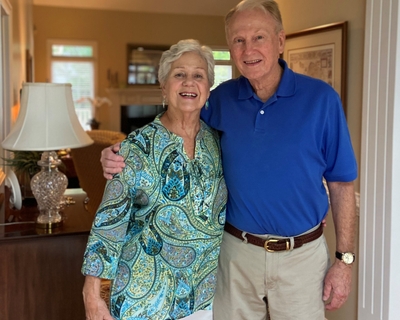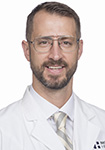You don’t hear these words much from a cancer survivor.
“I enjoyed it.”
That’s Johnny Watkins talking, a 79-year-old retiree from Kernersville, North Carolina. He was diagnosed with prostate cancer in February 2023. He had no symptoms. An elevated PSA level and biopsy detected the cancer.

He finished 20 radiation treatments in June, then got to make what can be one of life’s sweetest sounds when he clanged the bell signaling the end of the regimen. Now he’s undergoing hormone therapy to reduce the likelihood of recurrence.
It’s where he got to ring the bell that gives this story an extra dose of special. It was at Novant Health Cancer Institute - Kernersville, a five-minute drive from his home. No fighting traffic on U.S. 421 on the way to treatment at Novant Health Cancer Institute - Forsyth in Winston-Salem. None of the anxiety that comes with having to travel. When he said he enjoyed it, Watkins was speaking of the kindness shown by everyone who cared for him. He was also referring to Novant Health’s commitment to bringing care to its patients in the communities where they live.
As he puts it, “The peace of mind and the location.”
Questions about your health? Start with a visit to your primary care doctor.
Watkins’ treatment is just the latest example of how Novant Health is expanding big-city care into the smaller communities it serves. That means shorter drives and easier access to leading-edge procedures and technology, along with the expert care needed to deliver those treatments.
Kernersville, population 26,000, is 10 miles east of Winston-Salem and 17 miles west of Greensboro. It isn’t exactly in the country. But by expanding from urban centers and university settings, Novant Health is going where it is needed most.
That includes small and suburban towns. It also includes rural America, where studies show that Americans are more likely to die prematurely from the nation’s leading causes of death, including cancer, heart disease, lung disease and stroke. In some cases, Novant Health is able to help deliver the latest in stroke care for patients in rural areas. In others, it provides remote monitoring for cardiac patients who struggle with access or transportation issues.
Last year the Cancer Institute at Kernersville Medical center opened a dedicated breast cancer surgery clinic, a first for the area. A new linear accelerator installed in April serves patients like Watkins who need radiation therapy. It provides treatment for a variety of cancers, including brain, breast, prostate, lung, rectal and skin.
Watkins said the new technology was a big factor in his decision to undergo radiation close to home. From walking into the clinic then walking out, each daily treatment took 20 minutes. He was so free of side effects that he wondered (in jest!) whether they were actually giving him anything.
He also considered the alternative. “If I had to go to Winston-Salem,” he said, “I’d have to go to a bunch of parking lots.”
Dr. Andrew Fairchild, a radiation oncologist at Piedmont Radiology Oncology in Winston-Salem, said the linear accelerator allows for faster, more precise radiation treatments, as well as potentially fewer of them. It also offers more advanced image guidance, using CT images instead of X rays to verify patient positioning and target coverage.Fairchild relishes the opportunity to get to know his patients. Watkins was a pleasure, he said, upbeat and quick to laugh. Being able to receive radiation near home, Fairchild said, made a difficult experience that much easier to endure for Watkins.
In and out in 20 minutes?
“It makes a huge difference,” Fairchild said. “You can enjoy the rest of the things you want to do during the day.”
‘Until you’ve been through it …’
Talk with Watkins for a few moments and it’s clear that he sees the sunny side of life. He first laid eyes on his wife, Anita, when he was in third grade and picking grapes one day in his native Forest City, North Carolina. One encounter – the best line he could come up with was “Hello there” – and he was starstruck. So was Anita. She ran home from school and told her mother, “There’s the cutest boy in my class. He has red hair and his name is Johnny Watkins.”

They’ve been married 61 years. He retired from DuPont after 30 years in manufacturing, management and other departments. They have one son, Steve, and “granddogs” that always seem to need tending to.
Life is good. And when cancer came, as it does for too many, Johnny and Anita Watkins took comfort in knowing he would be taken good care of. Five minutes from home.
“All this stuff, until you’ve been through it, you don’t know what it means,” Anita Watkins said. “This treatment has been monumental.”
National Prostate Cancer Awareness Month
September is National Prostate Cancer Awareness Month, focusing on the importance of early screenings, detection and treatment. The American Cancer Society estimates that 288,300 new cases of prostate cancer will be diagnosed in the United States in 2023. Prostate cancer is the second leading cause of cancer death in American men, behind lung cancer. With early detection, though, the five-year survival rate is 98%. Symptoms, although rare, can include urination problems, swelling, numbness or pain in bones or tissues, constipation or loss of bowel control, weight loss and fatigue. In all matters of health, consult your physician and follow guidelines for proper screening.












